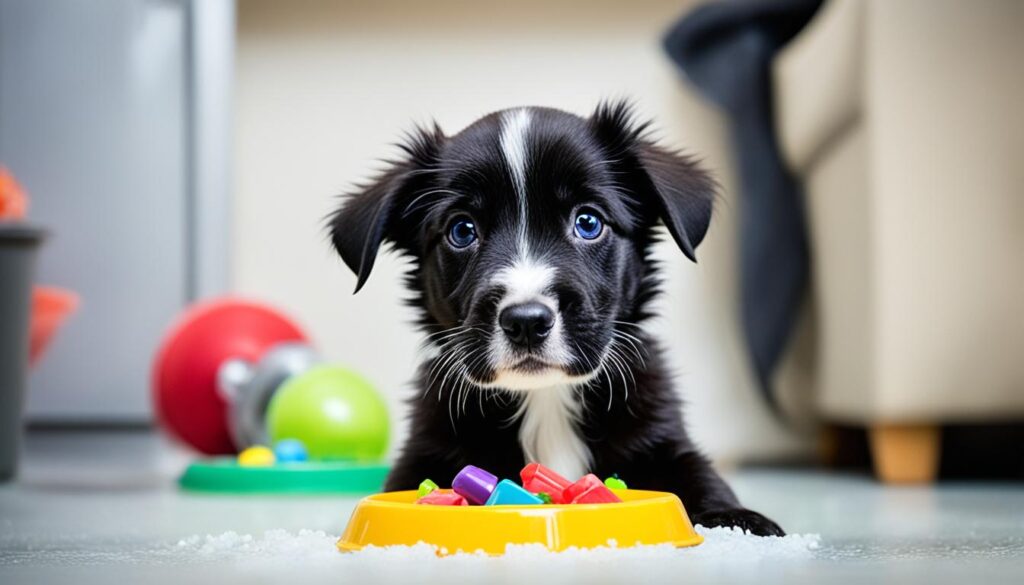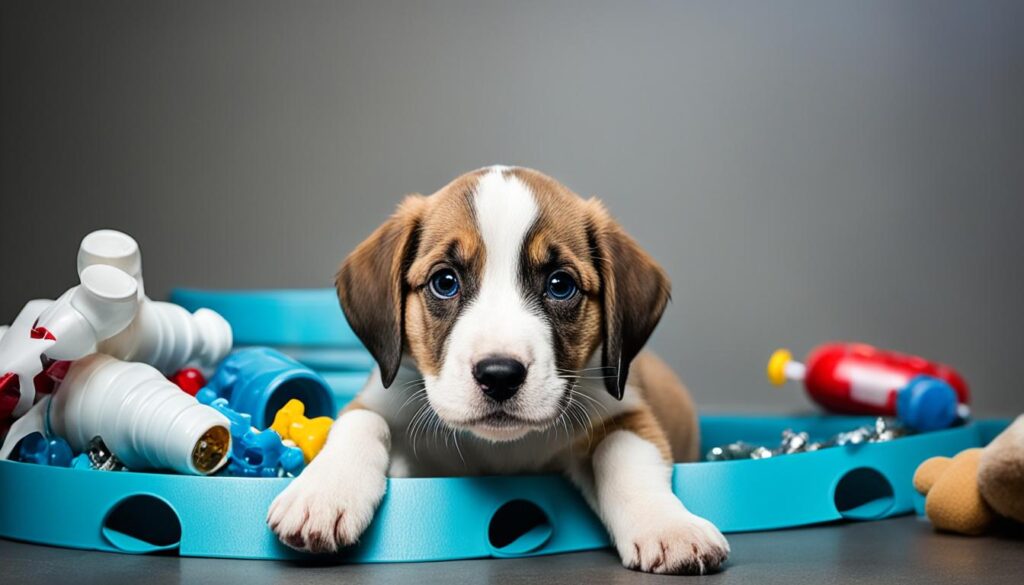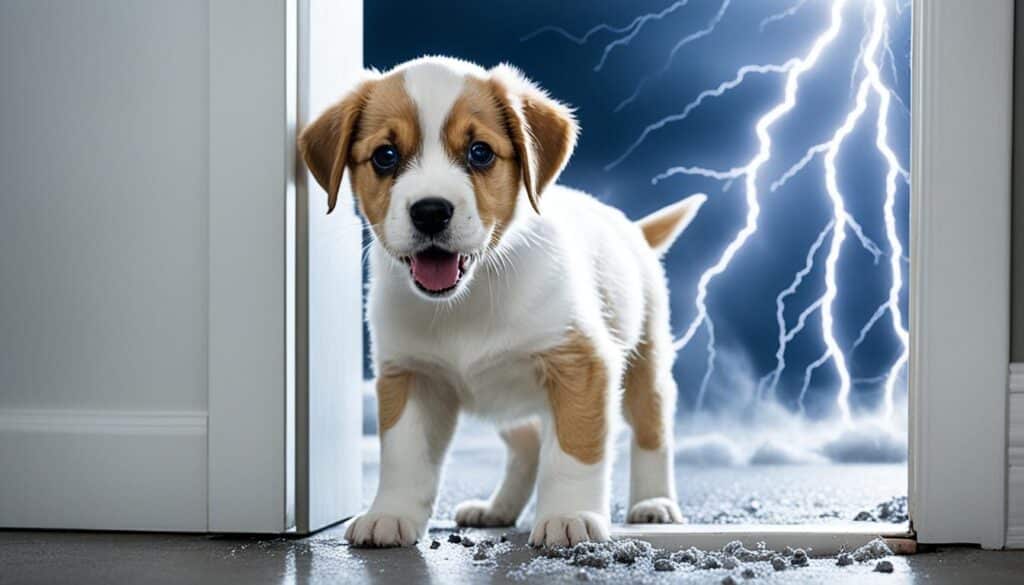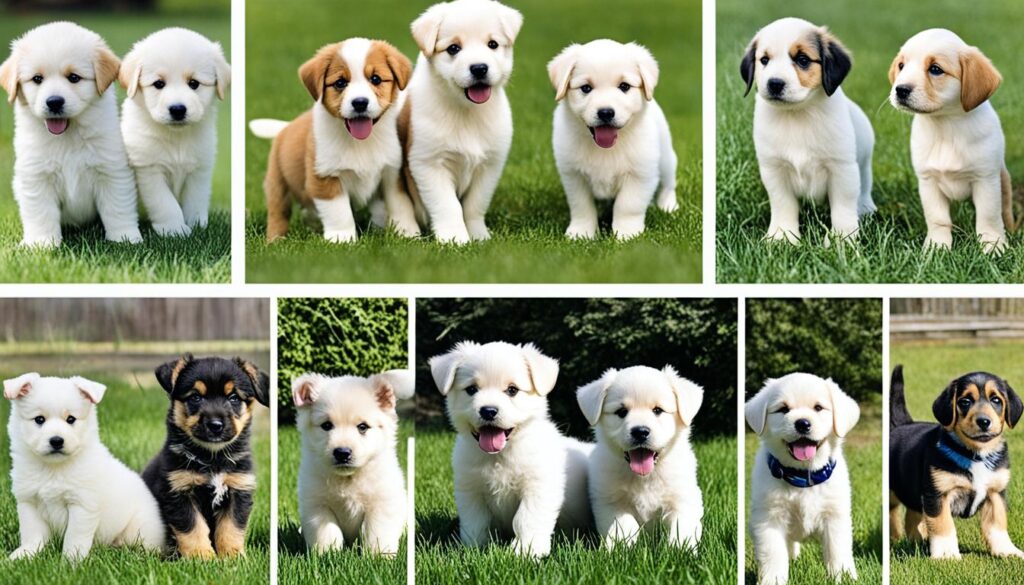
Puppies are known for their playful and lovable nature. However, just like humans, they can experience anxiety and stress. Understanding and addressing puppy anxiety is crucial for their overall well-being and development. Untreated anxiety in puppies can lead to long-term behavioral problems and anxiety disorders. As a responsible puppy owner, it is essential to recognize the signs of anxiety in puppies and take steps to help alleviate their stress.
Key Takeaways:
- Puppy anxiety is a real issue that needs to be acknowledged and addressed.
- Untreated anxiety in puppies can lead to long-term behavioral problems.
- Pet owners play a vital role in recognizing and treating anxiety in their puppies.
- Signs of anxiety in puppies include behavioral changes and physical manifestations of stress.
- Causes of puppy anxiety can range from separation anxiety to fear-related anxiety and underlying medical conditions.
- Calm and supportive environments, desensitization, and counterconditioning techniques can help alleviate puppy anxiety.
- If your puppy’s anxiety is severe, you should seek professional help.
Signs of Anxiety in Puppies
Recognizing the signs of anxiety in puppies is essential for addressing their stress and promoting their overall well-being. Puppies, like humans, can experience anxiety, and understanding their behavioral and physical manifestations can help us provide the necessary support and care they need.
Common Behavioral Signs
Puppies may exhibit various behavioral signs that indicate anxiety or stress. Look out for:
- If they show destructive behavior, such as chewing on furniture or shoes.
- Excessive barking or whining.
- Changes in appetite.
- Restlessness or pacing.
- Trying to escape or hide.
These behavioral signs offer insights into how a puppy may feel and allow us to address their anxiety effectively.
Physical Manifestations of Stress
Puppies also show physical signs of stress when they are anxious. Some common physical manifestations include:
- Panting or rapid breathing.
- Trembling or shaking.
- Pacing back and forth.
- Increased heart rate.
- Changes in bathroom habits.
By being aware of these physical signs of stress in puppies, we can provide comfort and help them feel more at ease.
Changes in Routine and Behavior
Puppy anxiety can often lead to changes in their routine and behavior patterns. Look for:
- Increased clinginess or need for attention.
- Avoidance of certain situations or people.
- Withdrawal from activities they used to enjoy.
- Difficulty sleeping or excessive sleepiness.
- Loss of interest in toys or play.
These changes in routine and behavior can indicate that your puppy may feel anxious and need additional support.

Causes of Puppy Anxiety
Understanding the causes of puppy anxiety is crucial in helping our dog friends live happy and peaceful lives. Several factors can contribute to anxiety in puppies, including separation anxiety, fear-related anxiety, and underlying medical conditions.
Separation Anxiety
One common cause of puppy anxiety is separation anxiety. Puppies can experience anxiety when separated from their owners or loved ones.The fear of being left alone can trigger intense anxiety in puppies, leading to destructive behaviors and excessive vocalization. It’s essential to address separation anxiety early on to prevent it from becoming a long-term issue.
Fear-Related Anxiety

Fear-related anxiety is another significant cause of anxiety in puppies. Puppies may develop anxiety in response to loud noises like thunderstorms or fireworks. They may also experience anxiety when encountering new people or animals. Providing a safe and secure environment for puppies is essential to help them feel less anxious in these situations.
Underlying Medical Conditions
In some cases, underlying medical issues can cause anxiety in puppies. Issues, such as thyroid disorders or hormonal imbalances, may contribute to anxiety symptoms in puppies. It’s necessary to consult a veterinarian to rule out any potential medical reasons for anxiety in puppies.
How to Calm Your Anxious Puppy
You can try several techniques to help calm an anxious puppy. Creating a safe space for your puppy, managing the environment to minimize triggers, desensitizing and counterconditioning, and using other calming techniques can reduce puppy anxiety and promote a sense of calm.
Create a safe space
Creating a safe and clean space for your puppy is essential in helping them feel secure and comfortable. Consider providing a crate or designated area where your puppy can relax when they need a break or feel overwhelmed. This safe space should be quiet, cozy, and stocked with familiar items like toys, blankets, and treats. Introducing your puppy to their safe space gradually and positively can help them associate it with feelings of safety and relaxation.
Manage the environment to minimize triggers
Reducing stressors in your puppy’s environment can help alleviate anxiety. Consider minimizing loud noises, bright lights, and crowded spaces that may overwhelm your puppy. Provide them with a calm and quiet area where they can retreat when they need a break. Additionally, offering positive distractions, such as puzzle toys or interactive feeding games, can redirect your puppy’s focus and help keep them calm.
Desensitization and counterconditioning
Desensitization and counterconditioning are behavior modification techniques that can help your puppy overcome anxiety triggers. Gradually exposing your puppy to the trigger in a controlled and positive way can help them build tolerance and associate the trigger with positive experiences. For example, if your puppy is afraid of thunderstorms, you can play calming music or use a ThunderShirt to help them feel more secure during storms. The goal is to replace their anxiety with relaxation and positive associations.
Other calming techniques
In addition to creating a safe space and utilizing desensitization and counterconditioning, you can try other calming techniques with your anxious puppy. Calming music, aromatherapy, and gentle massage are all natural methods that can help promote relaxation. Establishing a regular exercise routine, providing mental stimulation through puzzle toys, and using positive reinforcement training can also reduce anxiety and keep your puppy calm.
When to Seek Professional Help
If you notice that your puppy’s anxiety is severe and impacting their daily life, it may be time to seek professional help. Sure signs indicate that their anxiety needs professional intervention. For example, if your puppy exhibits aggressive behaviors towards themselves or others or engages in self-harm, it is crucial to consult a veterinarian or a veterinary behaviorist.
There are several types of professional support available to help treat puppy anxiety. Veterinarians specializing in animal health can guide and advise on managing and alleviating your puppy’s anxiety. Veterinary behaviorists are experts in animal behavior and can offer specialized behavior modification plans to address your puppy’s anxiety more comprehensively. Additionally, puppy trainers with experience in dealing with anxiety-related issues can provide practical strategies to manage your puppy’s anxiety.
The treatment options recommended by professionals may vary depending on the severity of your puppy’s anxiety. Behavioral modification techniques, such as desensitization and counterconditioning, can be effective in helping puppies overcome their anxieties over time. In some cases, you may also prescribe some medication to manage your puppy’s anxiety. It’s vital to consult with a professional to determine the most suitable treatment plan for your puppy’s specific needs.
FAQs
Q: How can I tell if my puppy is anxious?
A: Look for behavioral changes like excessive whining, barking, panting, trembling, hiding, pacing, restlessness, or destructive behaviors. Your puppy might also have accidents indoors, even if housetrained. Physical signs can include dilated pupils, tucked tail, or changes in appetite.
Q: My puppy seems anxious when I leave. Is this separation anxiety?
A: It very well could be. Separation anxiety is common in puppies. If your puppy becomes highly distressed when you’re gone – barking, howling, having accidents, or being destructive – it’s likely separation anxiety. Start with short absences and gradually work up to more extended periods away. Reward them for calm behavior when you return.
Q: My puppy gets scared of loud noises like thunder or fireworks. What can I do?
A: Create a safe space for your puppy, such as a cozy den or crate with blankets. Play calming music to mask the noise and distract your puppy. Desensitization training by gradually exposing them to recordings of the scary sounds at low volumes can help in the long term.
Q: Can natural remedies help reduce my puppy’s anxiety?
A: Some calming aids like pheromone diffusers or calming supplements may help. Talk to your veterinarian about options that could be suitable for your puppy. Lavender aromatherapy can also be soothing. However, always consult your vet before using any natural remedies.
Q: When should I consider professional help for my puppy’s anxiety?
A: If your puppy’s anxiety significantly impacts their quality of life or your at-home efforts aren’t making a difference, it’s time to seek professional help. A veterinarian can rule out medical causes. A certified dog behaviorist can develop a personalized plan to address your puppy’s anxiety.

